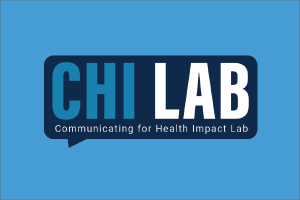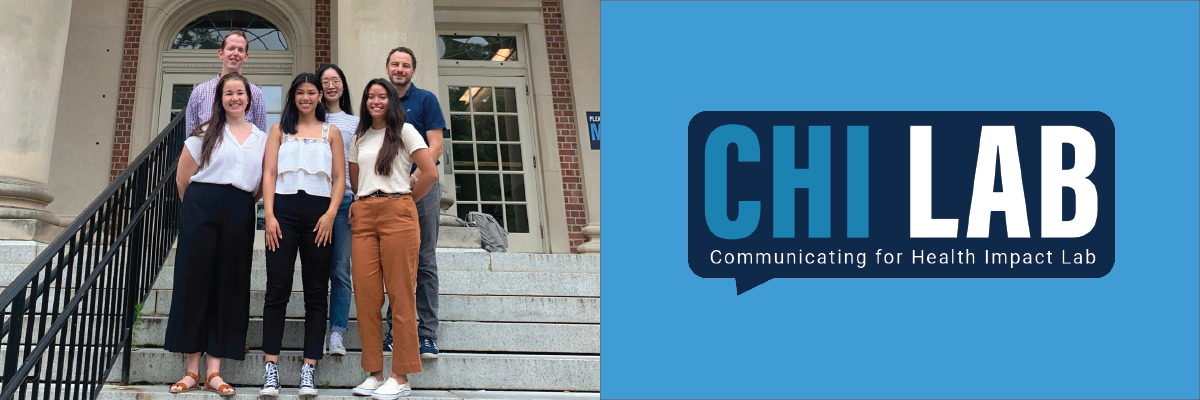Professor Seth Noar launches health communication lab

By Beth Hatcher
Building upon a robust legacy of health communication work at the school, Professor Seth Noar has launched the Communicating for Health Impact (CHI) Lab at the UNC Hussman School of Journalism and Media.
Noar, UNC Hussman’s James Howard and Hallie McLean Parker Distinguished Professor and a member of the UNC Lineberger Comprehensive Cancer Center, directs the CHI Lab, which produces health communication research promoting public health while serving as a research hub that can help UNC Hussman recruit some of the best and brightest health communication minds.
“I am passionate about how we can use communication to change behavior and prevent disease. Many of the health challenges of our time involve behavior change, and communication is an important tool we can use for positive impact,” said Noar, who joined the school in 2011. Noar has conducted research on health messages and campaigns for two decades, with much of his recent work focusing on cancer prevention and control, especially tobacco prevention and control messaging.
The lab — funded by two research grants from the National Institutes of Health and U.S. Food and Drug Administration with a combined total of $5 million — is currently engaged in two multi-year projects centered around adolescent tobacco and vaping prevention.
Working with Noar in the lab will be a full-time project manager, a postdoctoral researcher, students and faculty affiliates across UNC and other academic institutions such as Wake Forest University.
The lab's team is pictured below. Top row, left to right: Alex Kresovich, Haijing Ma, Seth Noar. Bottom row, left to right: Nora Sanzo, Emily Galper, Talia Kieu.

Faculty affiliates include: from the UNC Gillings School of Global Public Health, professors Noel Brewer, Kurt Ribisl and assistant professors Nisha Gottfredson and Marissa Hall. Joining them will be Assistant Professor Sarah Kowitt and Professor Ilona Jaspers from the UNC School of Medicine; Professor Paschal Sheeran from UNC’s Department of Psychology and Neuroscience; and Assistant Professor Jennifer Cornacchione Ross and Professor Erin Sutfin from the Wake Forest School of Medicine.
Haijing Ma, CHI Lab’s postdoctoral research associate, calls the lab’s work foundational and essential.
“Health communication is important because it addresses one of humans’ fundamental concerns — health — and contributes to improve the health status of individuals, as well as their quality of life,” Ma said. “In health communication, we translate hard science into plain language to show people what to expect from their behavior. Persuading people how to be healthy ultimately saves lives.”
The ongoing COVID-19 pandemic has further highlighted the importance of health communication, said Roy H. Park Fellow and Ph.D. student Alex Kresovich, a research assistant in the lab.
“Throughout this pandemic, the country has seen how vital it is to communicate clearly, efficiently and concisely about health communication in a way that broad audiences can understand,” Kresovich said.
Nora Sanzo, who serves as the lab’s research project manager, was drawn to the lab both by its important work and the chance to have a hand in its growth. “The work this lab is doing is impactful, and I am excited to not only disseminate those findings and help influence the field of health communication, but also grow this lab and show students how meaningful and important health communication is,” Sanzo said.
Before coming to UNC Hussman, Noar was an associate professor in the Department of Communication at the University of Kentucky, where he began his career in the health communication field. Reflecting on the past, Noar said, “I was extremely fortunate to begin my career at Kentucky with wonderful colleagues who helped me discover and grow my interests and passion for health communication. I couldn’t be more excited about this next step here at Carolina.”
Besides his work on adolescent tobacco prevention, Noar has conducted a myriad of health communication research projects throughout his career advancing an understanding of the impact of celebrity cancer diagnoses on information seeking about cancer; examining how cigarette graphic warnings labels can be an effective medium to motivate quitting in adult smokers; and evaluating how mobile and computer-delivered interventions can be effective for health behavior change.
Noar has co-edited two books, “Communication Perspectives on HIV/AIDS for the 21st Century” (2008) with Timothy Edgar and Vicki Freimuth, and “eHealth Applications: Promising Strategies for Behavior Change” (2012) with Nancy Harrington.
His work has also been published in numerous peer-reviewed journals in communication, such as Human Communication Research, Health Communication, and Journal of Health Communication, as well as journals in medicine, such as JAMA Pediatrics, JAMA Dermatology, and JAMA Internal Medicine. His studies have been repeatedly recognized by groups such as Web of Science as being in the top 1% most cited in the social sciences.
“Research is a team sport, and the number one engine that drives the work that we do is our talented students,” Noar said. Students who are interested in being involved with work at the CHI Lab can email the lab at chilab@unc.edu.